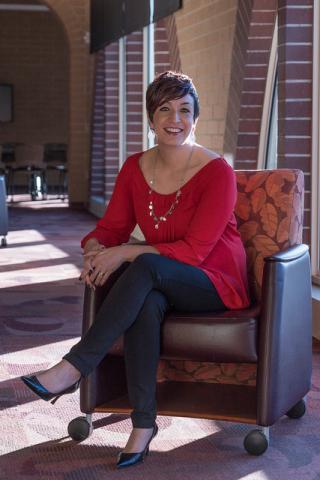New Report Examines Obstacles Facing Refugees Pursuing Postsecondary Schooling
Morgridge professor identifies opportunities for ‘educational justice’
Whether they migrated from Myanmar or Syria, Nepal or Honduras, most refugees in the United States hope to make a better life for themselves in their new country.
That means access to education at all levels, including colleges and universities. But, says associate professor Judy Marquez Kiyama of the University of Denver’s Morgridge College of Education, before they can take advantage of the available opportunities, refugees must negotiate countless barriers. Chief among them is the daunting fact that institutions — from public school systems to colleges and universities — simply don’t understand their realities.
“While there has been a lot of research on undocumented immigrant students, understanding the needs of refugee students has been largely ignored,” Kiyama says.
To help remedy that, Kiyama has co-authored “Failed Educational Justice: Refugee Students’ Postsecondary Realities in Restrictive Times,” a report commissioned by the Association for the Study of Higher Education and the National Institute for Transformation and Equity. It synthesizes existing knowledge about refugee students and, just as important, identifies areas for action — in research, policy and practice. It also complements Kiyama’s longstanding work on college prospects among underserved populations.
“My work has always focused on the role that families and communities play in cultivating college-going opportunities, college-going aspirations and college-going cultures within homes,” she explains.
Co-authored with Morgridge alumna Varaxy Yi, now assistant professor of educational leadership at California State University Fresno, the report is part of a collection of national papers examining other underserved populations in postsecondary education. These include the formerly and currently incarcerated, indigenous Americans, racial minorities, and low-income and first-generation students.
In compiling and examining the research, Kiyama, who chairs Morgridge’s higher education department, was struck by how challenging and discouraging it can be for refugee students to contend with the college application and admission process.
That’s often due to language barriers or unfamiliarity with the system. But it’s also attributable to the chaos associated with forced migration. “Some of these refugee families have been in a camp so long that they’ve never been part of an education system,” Kiyama explains. “They often don’t have the formal documentation or credentials of previous institutions they attended.” And if they can’t supply the right transcripts or diplomas, their applications go nowhere.
What’s more, in what the report labels “restrictive times,” many refugees face hostility and suspicion from communities outside their own. Even in less contentious times, they often are inadvertently diverted from higher education, if only because they typically settle in what the report calls “low-resourced communities with limited access to quality education.” In other words, they tend to be “guided into the workforce” rather than urged to pursue a college degree. Compared to other immigrants, the report notes, refugees are more likely to work in low-wage jobs and thus to have limited resources for schooling.
Not much is known about how they fare even when they do pursue higher education. “There is just no understanding of who these students are,” Kiyama says, adding that colleges and universities do not systematically collect any data about refugee students. As a result, they don’t know how many are in their applicant pools or even how many are already enrolled and how they adapt once on campus. Without this information, it’s difficult to develop programs and expand services to ensure inclusivity, persistence and success.
With these and other findings in mind, Kiyama and Yi identify some action items for communities, institutions and advocates. For starters, colleges and universities should identify what the report calls an “alternative means of credentialing students who do not have access to their formal transcripts.” In addition, admissions personnel are advised to learn about the resettlement experience and how it can affect everything from legal status to eligibility for financial aid. And at the local level, policy makers should seek to empower refugees through partnerships among high schools, community organizations and community colleges.
Suggestions like these can catalyze action within the education community. “This is such important work and exemplifies our social justice mission,” says Karen Riley, dean of the Morgridge College of Education. “Drs. Kiyama and Yi not only identified the issue, they provided pragmatic approaches to effecting real change. The action proposed requires various systems to work together to effectively serve these students, highlighting the seminal nature of their work.”
Kiyama’s own research complements the report’s findings. Partnering with Aurora’s RISE Colorado, which serves a wide range of refugee populations, she has learned about the experiences of, among others, Nepali, Burmese and Karen families and seen firsthand “the immense cultural strengths and power within [these] communities.”
Once these communities understand their rights and the resources available to them, they can seek solutions to their challenges. In Aurora, Kiyama says, such empowerment has yielded tangible results.
“In the last year, one of the biggest asks has been for more robust translation and interpretation services. Because of all the multiple languages being spoken in Aurora, oftentimes their children would come home with notes and announcements, or they would receive calls from school, but because it was in English they wouldn’t understand, of course. Now, Aurora public schools are offering more interpretation services.”
With “Failed Educational Justice” now in circulation, one fact, Kiyama says, stands out: “These families rally around wanting a better opportunity and education for their children, and they will make significant sacrifices in order to make that happen.”








